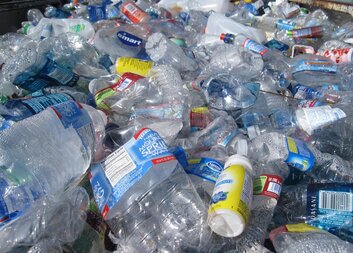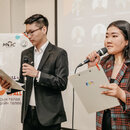Waste management is a key issue in Mongolia due to urbanization, industrialization, and increasing consumption of packaged products. Plastic waste is a particularly serious issue as it is causing widespread pollution and is also often dumped illegally, both by citizens and companies. CCR is implementing the project “Sustainable Plastic Recycling in Mongolia” (05/2020 – 04/2024), funded by the European Union (SWITCH-Asia program), along with four project partners: Environment and Security Center of Mongolia, EcoSoum, Mongolian Sustainable Development Bridge, and T.G. Masaryk Water Research Institute.
The overall objective of the project is to contribute to economic prosperity and poverty reduction and support the development of a green economy and the transition towards a low-carbon, resource-efficient and circular economy in Mongolia.
The specific objectives of the project are:
- To promote sustainable production and consumption (SCP) patterns by supporting SMEs and MSMEs in adopting SCP practices; The project aims to achieve these through improving the current production cycle of products made from recycled plastics and making overall consumption and waste management practices sustainable. In addition, the project will provide conditions for the replication of the tools provided and increase access by MSMEs to finance.
- To create an enabling environment to strengthen the implementation of national SCP policies and assist stakeholders in harvesting the benefits of SCP; This will be achieved through improving the system for plastic waste collection, sorting and classification, improving access by recycling-MSMEs to advanced equipment and technology and enhancing the conditions for scale-up and replication.
Total Budget: 2 million EUR
Project target areas:
- Ulaanbaatar: Establish an effective waste management system for plastic waste and support the development of plastic recycling industry.
- Bulgan province: Support the local recycling industry and assist the province to disseminate good practices.
- Khishig-Undur soum: Assist in establishing a waste management system in the soum and support the local plastic recycling industry.
Main areas of focus and key activities:
1. IMPROVED PLASTIC WASTE COLLECTION, SORTING AND CLASSIFICATION SYSTEM,
- Identify constraints on efficient collection of plastic waste in target areas and design plastic waste collection schemes suitable for urban and rural environment
- Organize training sessions for public authorities on plastic waste separation, collection and classification
- Form network of communities and CSOs to focus on raising consumers´ awareness of plastic waste separation and collection
- Organize awareness-raising activities at kindergartens, primary and high schools, universities, state and public institutions on waste collection and sorting
2. ACCESS TO ADVANCED EQUIPMENT AND TECHNOLOGIES FOR PLASTIC RECYCLING COMPANIES
- Organize seminars to introduce the technology innovations to the companies, explaining their economic feasibility
- Conduct analysis of constraints regarding access to finance faced by plastic recycling companies and facilitating interactions between plastic recycling companies and finance service providers
- Identify and designing new waste-based products from recycled plastic waste
- Facilitate trial plastic waste recycling solutions for rural areas, in cooperation with soum and aimag authorities
3. MORE CUSTOMERS FOR PLASTIC RECYCLING COMPANIES
- Build marketing capacities of plastic recycling MSMEs
- Develop health, safety and quality standards for products made of recycled plastic
- Organize seminars, workshops and exhibitions to promote recycled products
- Explore market opportunities for products made of recycled plastics
4. PROJECT OUTCOME IS EASILY REPLICATED IN OTHER SOUMS AND AIMAGS
- Organize events to involve decision-makers in follow-up activities aimed at replication and scale-up of results achieved by the project
- Establish cluster of local and international waste management experts who will participate in further replication actions
- Develop and disseminate replication packages containing findings, recommendations, solutions and best practices produced by the project





